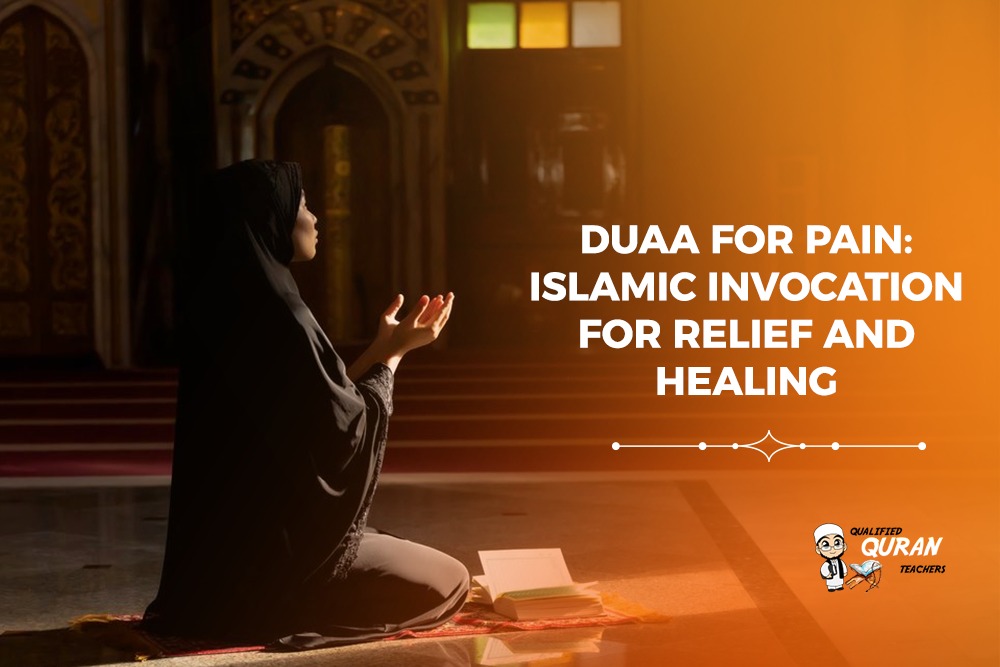Duaa for Pain: Islamic Invocation for Relief and Healing
SEO Meta-description: Discover the power of duaa for pain, a profound Islamic invocation for relief and healing. Learn how this spiritual practice can bring comfort and solace in times of physical and emotional distress.
Pain, whether physical or emotional, is a universal experience that can deeply affect our quality of life. In Islam, turning to Allah in times of distress is a fundamental aspect of faith. Muslims believe that duaa (supplication) is a powerful means of communication with Allah, seeking His mercy and assistance in alleviating pain and hardship. This article explores the concept of duaa for pain, offering insights into its significance and examples of supplications for relief and healing.
Understanding Duaa for Pain
Duaa is more than just a prayer; it’s an expression of a Muslim’s dependence on Allah, acknowledging His power and mercy. When experiencing pain, Muslims are encouraged to make duaa, not only seeking relief but also demonstrating their trust in Allah’s wisdom and compassion. The Prophet Muhammad (PBUH) taught specific duas that can be recited for pain, illustrating the importance of turning to Allah in every circumstance.

Significance of Duaa in Alleviating Pain
The practice of making duaa in times of pain is deeply embedded in Islamic tradition. It serves multiple purposes:
- Spiritual Healing: It reminds individuals of their connection to Allah, offering spiritual comfort and peace.
- Physical Relief: While duaa is not a substitute for medical treatment, it is believed to accompany and support the healing process.
- Emotional Solace: Reciting duaa can provide a sense of hope and patience, reducing stress and anxiety associated with pain.
Examples of Duaa for Pain
- Duaa for Pain in the Body:
- Arabic: “أَعُوذُ بِاللهِ وَقُدْرَتِهِ مِنْ شَرِّ مَا أَجِدُ وَأُحَاذِرُ”
- Transliteration: “A’udhu billahi wa qudratihi min sharri ma ajidu wa uhadhiru.”
- Translation: “I seek refuge in Allah and in His Power from the evil of what I find and of what I fear.”
- Duaa for General Suffering:
- Arabic: “اللَّهُمَّ رَبَّ النَّاسِ، أَذْهِبِ الْبَأْسَ، اشْفِ وَأَنْتَ الشَّافِي، لَا شِفَاءَ إِلَّا شِفَاؤُكَ، شِفَاءً لَا يُغَادِرُ سَقَمًا”
- Transliteration: “Allahumma rabban-nas, adhhibil-ba’s, ishfi, wa antash-shafi, la shifa’a illa shifa’uka, shifa’an la yughadiru saqama.”
- Translation: “O Allah, the Lord of mankind, remove the difficulty and heal [the person], for You are the Healer. There is no healing but Yours, a healing which leaves behind no ailment.”
How to Incorporate Duaa into Your Life for Pain Relief
- Regular Practice: Make duaa part of your daily routine, especially when you feel pain or discomfort.
- Mindful Recitation: Understand the meanings of the duas you recite to deepen your connection and intention.
- Patience and Trust: Have patience and trust in Allah’s plan, knowing that every supplication is answered in the best manner, though it may not always align with your expectations.
- Seek Medical Treatment: Remember that seeking medical treatment for ailments is encouraged in Islam and can be considered a part of taking action while putting trust in Allah.
Embracing the power of duaa, particularly when seeking relief from pain, reflects a profound aspect of the Muslim faith, which emphasizes reliance on Allah’s mercy and compassion. This reliance is not passive but a dynamic form of worship that combines heartfelt supplication with proactive steps towards healing. The practice of making duaa for pain serves as a spiritual remedy that complements physical treatments, underscoring the holistic approach to health in Islam.
Integrating Duaa into the Healing Process
The integration of duaa into the healing process is a multifaceted approach that encompasses spiritual, physical, and emotional dimensions of health. Here are further insights and practices to deepen this integration:
- Spiritual Reflection and Connection: Use the time spent in duaa to reflect on your relationship with Allah. Pain, while challenging, can also be a means of drawing closer to Allah, fostering a deeper spiritual awareness and connection.
- Combining Duaa with Action: Islam teaches that seeking cure through medical means is a form of reliance on Allah. The Prophet Muhammad (PBUH) said, “Make use of medical treatment, for Allah has not made a disease without appointing a remedy for it, with the exception of one disease, namely old age.” This hadith encourages Muslims to actively seek healing and view medical treatment as part of Allah’s plan for relief.
- Community Support and Collective Duaa: There is great strength in community and collective prayer. Sharing your struggles with trusted friends or family members and asking them to make duaa for you can amplify the spiritual support, providing comfort and strength during difficult times.
- Patience and Perseverance: Pain and suffering can test one’s faith and patience. However, patience (sabr) is highly valued in Islam and is considered a virtue that leads to rewards from Allah. Making duaa with patience reflects a heart content with Allah’s decree, open to receiving His guidance and assistance in any form it comes.
- Finding Solace in Quranic Verses: Alongside specific duas, reciting verses from the Quran can also bring immense relief and peace. Verses that remind you of Allah’s mercy, such as Ayat al-Kursi (The Throne Verse) or Surah Ar-Rahman, can be particularly comforting.
Duaa for Emotional and Psychological Pain
It’s important to recognize that pain is not always physical. Emotional and psychological distress can be equally debilitating. The following duaa can be recited for relief from such pain:
- Arabic: “يَا حَيُّ يَا قَيُّومُ بِرَحْمَتِكَ أَسْتَغِيثُ”
- Transliteration: “Ya Hayyu Ya Qayyum, bi rahmatika astagheeth.”
- Translation: “O Living, O Sustaining, in Your mercy, I seek relief.”
This duaa calls on Allah by His names Al-Hayy (The Ever-Living) and Al-Qayyum (The Sustainer), emphasizing His eternal presence and the endless bounty of His mercy.
Conclusion: Embracing Healing with Faith
In conclusion, duaa for pain is an embodiment of the Muslim’s unwavering faith in Allah’s power and mercy. It is a practice that not only seeks relief from suffering but also strengthens the soul, nurtures patience, and deepens the believer’s relationship with their Creator. By incorporating duaa into the healing journey, Muslims can navigate the trials of pain with hope, resilience, and a profound sense of spiritual solace.
Duaa for pain is a testament to the profound belief in Allah’s mercy and healing. It embodies the Islamic principle of complete reliance on Allah while actively seeking means to alleviate suffering. Whether you are facing physical ailment, emotional distress, or spiritual challenges, the act of making duaa invites divine assistance and comfort, guiding you towards peace and recovery in your journey of faith.
حَدَّثَنِي أَبُو الطَّاهِرِ، وَحَرْمَلَةُ بْنُ يَحْيَى، قَالاَ أَخْبَرَنَا ابْنُ وَهْبٍ، أَخْبَرَنِي يُونُسُ، عَنِ ابْنِ شِهَابٍ، أَخْبَرَنِي نَافِعُ بْنُ جُبَيْرِ بْنِ مُطْعِمٍ، عَنْ عُثْمَانَ بْنِ أَبِي الْعَاصِ الثَّقَفِيِّ، أَنَّهُ شَكَا إِلَى رَسُولِ اللَّهِ صلى الله عليه وسلم وَجَعًا يَجِدُهُ فِي جَسَدِهِ مُنْذُ أَسْلَمَ . فَقَالَ لَهُ رَسُولُ اللَّهِ صلى الله عليه وسلم “ ضَعْ يَدَكَ عَلَى الَّذِي تَأَلَّمَ مِنْ جَسَدِكَ وَقُلْ بِاسْمِ اللَّهِ . ثَلاَثًا . وَقُلْ سَبْعَ مَرَّاتٍ أَعُوذُ بِاللَّهِ وَقُدْرَتِهِ مِنْ شَرِّ مَا أَجِدُ وَأُحَاذِرُ ” .
Uthman b. Abu al-‘As Al-Thaqafi reported that he made a complaint of pain to Allah’s Messenger (ﷺ) that he felt in his body at the time he had become Muslim. Thereupon Allah’s Messenger (ﷺ) said:

